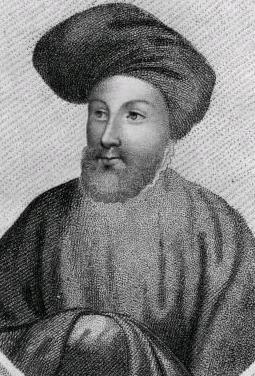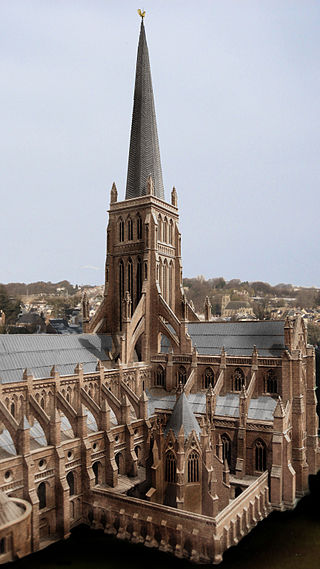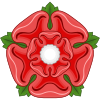
Pope Boniface IX was head of the Catholic Church from 2 November 1389 to his death, in October 1404. He was the second Roman pope of the Western Schism. During this time the Avignon claimants, Clement VII and Benedict XIII, maintained the Roman Curia in Avignon, under the protection of the French monarchy. He is the last pope to date to take on the pontifical name "Boniface".

Henry Beaufort was an English Catholic prelate and statesman who held the offices of Bishop of Lincoln (1398), Bishop of Winchester (1404) and cardinal (1426). He served three times as Lord Chancellor and played an important role in English politics.

John Beaufort, 1st Marquess of Somerset and 1st Marquess of Dorset, later only 1st Earl of Somerset, was an English nobleman and politician. He was the first of the four illegitimate children of John of Gaunt (1340–1399) by his mistress Katherine Swynford, whom he later married in 1396.

Thomas Arundel was an English clergyman who served as Lord Chancellor and Archbishop of York during the reign of Richard II, as well as Archbishop of Canterbury in 1397 and from 1399 until his death, an outspoken opponent of the Lollards. He was instrumental in the usurpation of Richard by his cousin Henry Bolingbroke, who became Henry IV.

Edward, 2nd Duke of York, was an English nobleman, military commander and magnate. He was the eldest son of Edmund of Langley, 1st Duke of York, and a grandson of King Edward III of England. He held significant appointments during the reigns of Richard II, Henry IV, and Henry V, and is also known for his translation of the hunting treatise The Master of Game. He was killed in 1415 at the Battle of Agincourt, whilst commanding the right wing of the English army.

Roger de Mortimer, 4th Earl of March, 6th Earl of Ulster was an English nobleman. He was considered the heir presumptive to King Richard II, his mother's first cousin.
Thomas Merke was an English priest and Bishop of Carlisle from 1397 to 1400.
Robert Waldby was a native of York and friar of the Order of Saint Augustine who followed Edward, the Black Prince into Aquitaine, and undertook a number of diplomatic missions on his behalf. After studying at Toulouse, he became professor of theology there. He later became close to Edward's son, King Richard II. He was a firm opponent of John Wycliffe, wrote a book denouncing him, and was a member of the Synod which assembled at Oxford in 1382 to judge his orthodoxy.
James Butler, 3rd Earl of Ormond, was a noble in the Peerage of Ireland. He acceded to the title in 1382, and built Gowran Castle three years later in 1385 close to the centre of Gowran, making it his usual residence, whence his common epithet, The Earl of Gowran.
The Treasurer of the Chamber was at various points a position in the British royal household.
John Gilbert was a medieval Bishop of Bangor, Bishop of Hereford and Bishop of St. David's.
Events from the 1390s in England.
This article is about the particular significance of the century 1301–1400 to Wales and its people.
Sir John Bussy of Hougham in Lincolnshire was a member of parliament representing Lincolnshire or Rutland eleven times from 1383 to 1398 as a Knight of the Shire. He was also Speaker of the House of Commons at the three Parliaments between 1393 and 1398, during which he supported the policies of king Richard II. He was most famous for orchestrating the abdication of parliament's power to an eighteen-man subcommittee in order to concentrate power in the hands of the king's supporters.
Nicholas [of] Hereford was an English Bible translator, Lollard, reformer on the side of John Wycliffe, Fellow of The Queen's College, Oxford and Chancellor of the University of Oxford in 1382. He was a Doctor of Theology, which he achieved at Oxford University in 1382.
Richard Northalis was an English-born cleric and judge who spent much of his life in Ireland. He held the offices of Bishop of Ossory, Archbishop of Dublin and Lord Chancellor of Ireland. For the last decade of his life, he was one of the English Crown's most trusted advisers on Irish affairs.
Nicholas Potyn was an English politician.

The Dean and Chapter of St Paul's Cathedral was the titular corporate body of St Paul's Cathedral in London up to the end of the twentieth century. It consisted of the dean and the canons, priests attached to the cathedral who were known as "prebendaries" because of the source of their income. The Dean and Chapter was made up of a large number of priests who would meet "in chapter", but such meetings were infrequent and the actual governance was done by the Administrative Chapter headed by the dean, made up of several senior "residentiary canons", who were also known as the "Dean and Canons of St Paul’s" or simply "The Chapter".

Sir Robert Cary of Cockington, Devon, was twelve times Member of Parliament for Devon, in 1407, 1410, 1411, May 1413, April 1414, Mar. 1416, 1417, 1419, May 1421, 1422, 1425 and 1426. Much of his later life was devoted to regaining the many estates and other landholdings forfeited to the crown following his father's attainder in 1388. He was an esquire in the households of King Richard II (1377–1399) and of the latter's half-brother John Holland, 1st Duke of Exeter.

Sir Alexander Lindsay of Glenesk was a Scottish knight banneret. Active in jousting and as a crusader he was in favour with the Scottish kings David II and Robert II.










